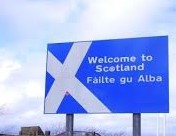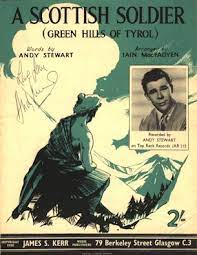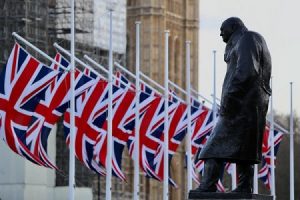
From unsplash.com / © Stewart M
Most people in Scotland last week were disappointed, though probably not greatly surprised, to see their national team get a drubbing in the first round of the Euro 2021 tournament. However, I suspect not everyone in Scotland was sad to see the team fail.
One person I’m sure was delighted was the Scottish, but very British-nationalist, blogger Effie Deans, who before the start of the tournament had tweeted a picture of a past Scotland-England football match and demanded angrily, “Why are there international matches between parts of the same country?” Similarly, I imagine certain fans of Glasgow Rangers, a football club whose culture revolves around such British symbols as the Queen and the Union Jack, weren’t sorry to see the Scottish national team flop. Indeed, an article in the Daily Record newspaper on July 8th confirmed that some Rangers fans were unwilling to support Scotland during Euro 2021.
For Deans and a certain segment of the Rangers faithful, the belief seems to be that if you regard your country primarily as Britain, then you can’t support Scotland. In fact, acknowledging Scotland on an international stage is damaging to your sense of Britishness and shouldn’t be encouraged. Scotland? No, it’s Not-land.
It’s not just in sport. The idea that Scotland might have its own culture and languages is anathema to some people. The right-wing Spectator magazine has printed pieces by embittered Scottish Daily Mail columnist Stephen Daisley and uptight Scottish composer James MacMillan complaining that (a) Scottish culture is infantile and embarrassing; but (b) if you’re stupid enough to be into Scottish culture, you’re somehow a Mussolini-type fascist too. Amusingly, after MacMillan complained – falsely, because the man has actually won a number of Scottish awards – about Glaswegian novelist Andrew O’Hagan being cold-shouldered by the Scottish arts establishment for not being sufficiently supportive of Scottish independence, O’Hagan began, in the wake of the Brexit referendum, making favorable noises about Scotland becoming independent.
Particularly nasty has been the abuse aimed at the Scottish Gaelic and Scots languages. Right-wing unionist twitter in Scotland is a constant whinge-fest about road-signs having names printed in Gaelic as well as in English. Effie Deans again, complaining about travelling to Fort William last year: “The number of times I missed my turning made me wish the signs were in one language or the other, but not both…” Well, dear, maybe try reading the parts of the signs that are written in the language you understand?
Meanwhile, dodgy, right-wing Unionist political carpetbagger George Galloway – at least, he’s right-wing when he’s in Scotland trying to hoover up Conservative votes; when he’s in England he campaigns as a left-wing man of the people – recently caused a pile-on on Scots-language poet Len Pennie after he made disparaging remarks on twitter about her and the medium in which she works. And a few years back, Jackie Kay, Scotland’s Machar (poet laureate) received brickbats when one of her Scots-language poems was among the items given to new mothers as part of Scotland’s ‘baby box’ initiative. “A woman from Bishopbriggs, writing doggerel,” sneered Ian Smart, prominent social media presence and self-styled ‘lefty lawyer’ and ‘Scottish Labour Party hack’.
Again, among many Scottish people who don’t see Scotland as a country but as a region, or as a big glorified county, of the mightier and more majestic entity that is the United Kingdom, there’s a conviction that Scottish culture can’t be real. Accepting the existence of Scottish culture implies the place being different from the rest of the UK. Therefore, culturally, there’s no such thing as Scotland either. It’s Not-land.

From youtube.com
Predictably, the fact that there’s now a Scottish parliament in existence, separate from the parliament in London, is something that drives many British-loyal Scots to distraction, especially when the past 14 years have seen it run by a party, the Scottish National Party, dedicated to pulling Scotland out of their beloved UK. Particularly guaranteed to make them gnash their teeth and froth at the mouth is any suggestion that the Scottish government, like the Scottish football team, might be recognized on an international level. The moment First Minister Nicola Sturgeon pronounces on some international matter or dares to show her face at some international conference, Scottish twitter is raging with indignant people who have Union Jacks in their profiles (and usually the words ‘Rangers’ and the acronym ‘WATP’, which a Glasgow-Celtic-supporting friend assures me stands for ‘We adore the Pope’) slavering about her having ‘ideas above her station’ and being just the head of a ‘wee parish council’, and not knowing ‘her place’. Can’t she see that she isn’t the First Minister of Scotland, but that of Not-land?
This desire to erase the concept of Scotland from everyone’s consciousness is, it has to be said, one that’s been exhibited lately by the British government too. British diplomats have been ordered to stop talking about the ‘four nations’ of the UK and talk about it as a single country only, while supermarkets have seen a recent craze for plastering Union Jacks over foodstuffs made in Scotland. Meanwhile, Prime Minister Boris Johnson, that symbol of everything decent, moral, honest and faithful about dear old Blighty, was heard bragging that at the upcoming COP26 climate summit in Glasgow he was going to slather the event in Union Jacks and wouldn’t allow Nicola Sturgeon anywhere near it.
Just last Friday, Johnson’s education minster urged schools across the UK to honour something called One Britain, One Nation Day, wherein schoolchildren were made to sing a song, specially composed for the occasion, that ended with the four-times-repeated refrain: “Strong Britain, great nation!” Though considering what’d come to light by Friday, I suspect the savvier kids had changed the words to: “Matt Hancock, penetration!” Unfortunately, hopes that this would convert all Scottish children to worshipping Winston Churchill, Spitfires and the Union Jack were dashed by the fact that in Scotland most schools had broken up for the summer holidays the day before.
This strikes me as ironic because I’m old enough to remember a time in Scotland when it was perfectly possible for many people, possibly even a majority of people, to wear their Scottish identity as proudly as they wore their British identity and segue effortlessly from one to the other even when it involved expressing contradictory sentiments. This meant they enthusiastically supported Scottish sports teams, enthusiastically recited Scots-language poetry by Robert Burns and, generally, enthusiastically indulged in all things Scottish: golf, whisky, tartan, ceilidhs, Highland games, etc. Simultaneously, though, they thought the Royal Family were wonderful, cheered on the British Olympics team and got misty-eyed with nostalgia about how ‘we’, meaning Britain, had fought off the Nazis during World War II.
They also voted for anti-Scottish-independence political parties, mainly the Labour Party, although there was support for the Conservative Party too. Scotland’s Tory MPs, incidentally, were experts at broadcasting a dual Scottish / British identity. See Albert McQuarrie, MP for Banff and Buchan, who loved whisky and called himself the ‘Buchan Bulldog’; or Nicholas Fairbairn, the tartan-swathed representative of Perth and Kinross. Although McQuarrie worshipped the ground Margaret Thatcher walked on, I think he was at heart a decent bloke. Fairbairn, however, was a vile specimen.
When I look at Scottish right-wing / pro-British twitter, I see a common sentiment expressed in many of the profiles: “Hate what the SNP have done to Scotland!” Which suggests that in the old days, before the SNP achieved political dominance, Scotland was a kinder, less partisan place. But I remember it being far worse when there was no parliament, the SNP had only a handful of MPs and independence was regarded as a crazy pipe-dream. In the 1980s, I recall crowds of Scottish rugby fans in pubs in Edinburgh, after international rugby matches, coming out with vehemently anti-English abuse that would probably get them arrested today. Indeed, English rugby skipper Will Carling has terrible memories of playing in Edinburgh in 1991, when the Scottish Rugby Union decided to air the anthem Flower of Scotland, with its references to sending the English ‘homeward, to think again,’ before the start of the match. There was, he claimed, “more noise, more patriotism – more hatred – than I have ever experienced”. Yet many of these Scottish rugby enthusiasts were well-to-do and would have voted Tory. The prospect of an independent Scotland would have horrified them. Evidently, feeling British for a good part of the time was no barrier to you wanting to stick it to the English.
Incidentally, before the SNP took power in Scotland and even before the Scottish parliament was created, Scotland was still allowed near the international stage occasionally. This was despite it being an era when Margaret Thatcher and then John Major ran Scotland from London with what at times seemed an imperious disdain you’d associate with a colonial governor. For instance, in 1993, while I was living on the northern Japanese island of Hokkaido, I remember the Scottish Office sending a group of officials there for a special Hokkaido-Scotland link-up. I blagged an invitation to the event through a Japanese colleague with political connections who’d later serve in the House of Representatives in the Japanese Diet. Obviously, the Scottish group had the delicate job of talking up Scotland without commenting on the running of the place by their bosses, the British Conservative government, whom few Scottish people had voted for. They remained impeccably straight-faced, non-committal and evasive when, during a panel discussion, my colleague raised the possibility of a devolved Scottish parliament being set up. (Actually, I’d primed her to mention this.) Their masks only slipped, from blandness to dismay, at the reception afterwards. Some hapless Hokkaido bigwig gave them a speech of welcome and told them how he loved “that great Scottish song, Danny Boy.”

© James S. Kerr
I suspect the comfortable co-existence of Scottish and British loyalties was fostered largely by the military. The British Army’s Scottish regiments were canny in exploiting soldiers’ sense of Scottishness, decking them out in tartan and having them led by pipe bands, even while they defended and promoted Britain, the Crown and the Empire (an empire that, admittedly, the Scots did very well out of). I found it fascinating in my youth to see how normally uppity and cantankerous Scotsmen would suddenly become deferential and forelock-tugging at the sound of a posh, officer-class, English accent. However, cuts to the military budget have left the 21st century British Army a shadow of its former self and the old Scottish infantry regiments have been reduced to just one, the Royal Regiment of Scotland. So that influence barely exists now.
Another thing that once made Scots feel proudly British, certainly working-class ones, was the existence of many nationalized industries that provided them with employment and had the name ‘British’ in their titles: British Coal, British Gas, British Rail, British Steel and so on. These encouraged the idea that working-class Scots were toiling alongside their comrades in England and Wales for a common cause, for the good of a benign, fair, welfare-state-supporting UK. Of course, that idea died a death when Thatcher, with her zeal for privatizing the British economy, arrived in power in the 1980s.
I’m not sure how this will end. It may be that Scotland gets another shot at an independence referendum in the future and votes to go its own way. Or it may be that the stringent British nationalism / unionism of the 21st century prevails and Scotland becomes merely a Union-Jack-swathed province at the rump-end of right-wing, post-Brexit Britain. If the latter option happens, I expect Westminster to abolish the Scottish parliament at some point. Not-land indeed.
But what’s isn’t an option now is the comfy middle-ground, the old fashioned, dual-loyalty, at-ease-with-both-worlds, Scottish / British identity. As far as that’s concerned… Well, to quote a well-kent Scottish anthem: “Those days are past now, and in the past, they must remain.”

From unsplash.com / © Kristina G.
